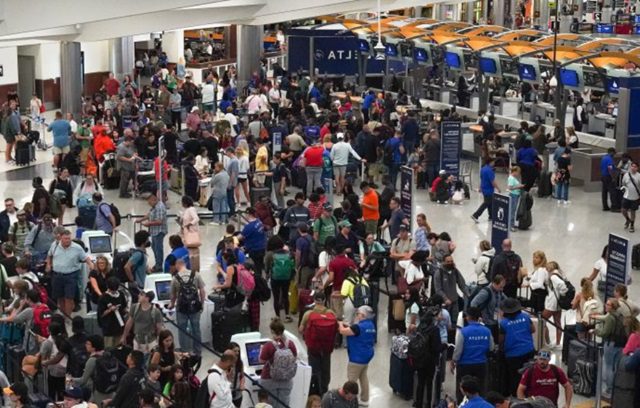BTN News: For the third day in a row, the United States has seen over 1,500 flight cancellations as airlines grapple with the aftermath of a significant global tech disruption. Thousands of passengers remain stranded at airports, causing widespread frustration and chaos.
Thousands of Flights Affected
On Sunday night, around 1,500 flights to, from, or within the United States were canceled, while more than 7,400 flights experienced delays, according to FlightAware.com. Delta Air Lines alone accounted for over 600 of these cancellations. The airline attributed the issues to a technological problem with an external provider, which led to widespread delays and cancellations. Delta has been in direct communication with affected passengers, offering travel vouchers, waivers, and SkyMiles as compensation.
Ongoing Recovery Efforts
Delta Air Lines CEO Ed Bastian updated customers on Sunday afternoon, assuring them that efforts to restore the system and resume normal operations were ongoing. Bastian emphasized that canceling flights is a last resort and is taken very seriously by the airline.
Broader Impact of the Tech Issue
The tech disruption wasn’t limited to airlines. Businesses, government agencies, emergency services, banks, schools, and universities worldwide experienced interruptions due to a faulty software update for Microsoft Windows systems issued by cybersecurity firm CrowdStrike. According to experts, around 8.5 million Windows devices were affected. CrowdStrike’s CEO, George Kurtz, apologized for the inconvenience and mentioned that a solution was in place, but experts warn that full recovery will be a lengthy process.
Airlines Continue to Struggle
Although major airlines reported that services were being restored, they warned of potential further delays and disruptions. United Airlines stated that most of its systems had recovered from the Friday outage, though more than 400 flights were canceled on Saturday and over 200 on Sunday. Delta temporarily suspended unaccompanied minor travel until Wednesday due to the service interruption. American Airlines and Allegiant Air also faced significant disruptions but have since resumed normal operations while addressing the backlog of customer messages and system issues.
Expert Insights on the Challenge
David Kennedy, co-founder of cybersecurity firm Binary Defense, explained that resolving the issue is not a simple task. Each affected computer, spread across thousands of boarding gates, must be manually restarted, adding layers of complexity to the recovery process. Kennedy noted the lack of sufficient personnel at airports to handle the extensive rebooting required.
Government Response and Passenger Rights
The U.S. Department of Transportation classified the flight delays and cancellations as “controllable,” meaning they are attributed to the airlines, which must adhere to their customer service commitments. Transportation Secretary Pete Buttigieg emphasized that passengers are entitled to prompt refunds if their flights are canceled and they do not accept rebooking options.
Passenger Frustration and Airport Chaos
At Hartsfield-Jackson Atlanta International Airport, the world’s busiest, passengers faced long lines and uncertainty as many flights remained canceled or delayed. Airport officials provided assistance and guidance to overnight passengers and worked with airlines to create areas for luggage reunification. Passengers voiced their frustrations, with some describing scenes of chaos, hunger, and fatigue as they waited for assistance.
Real-Life Experiences of Stranded Travelers
Stories of disrupted travel plans were common among the stranded passengers. Catalina Villareal, a Delta passenger, described the situation as chaotic and frustrating after experiencing three flight cancellations. Charlotte Yeh from Boston’s Logan International Airport missed her flight to celebrate her father’s 96th birthday in Fort Lauderdale due to lack of notification about the cancellation. Richard Whitfield and Jonathan Shade from Pasco County, Florida, faced a series of delays and cancellations, resulting in a two-night stay at an airport hotel with no travel vouchers provided. Their ordeal highlighted the ripple effect such disruptions have on essential needs like food, sleep, and shelter.
Looking Forward
As airlines and passengers navigate this challenging situation, there remains hope for a return to normalcy. Whitfield and Shade managed to secure a flight back to Tampa on Saturday afternoon, hoping for no further delays or cancellations. Meanwhile, the travel community continues to adapt, share experiences, and find resilience in the face of unexpected adversity.


